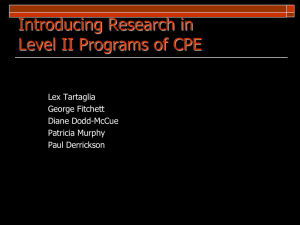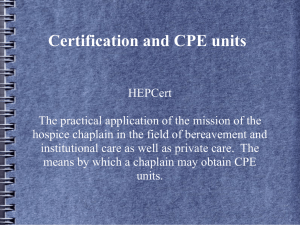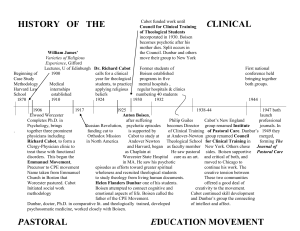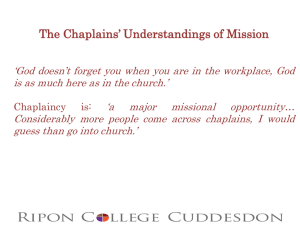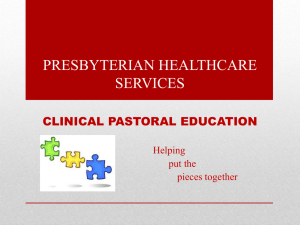Teaching Research in CPE Residency Programs
advertisement
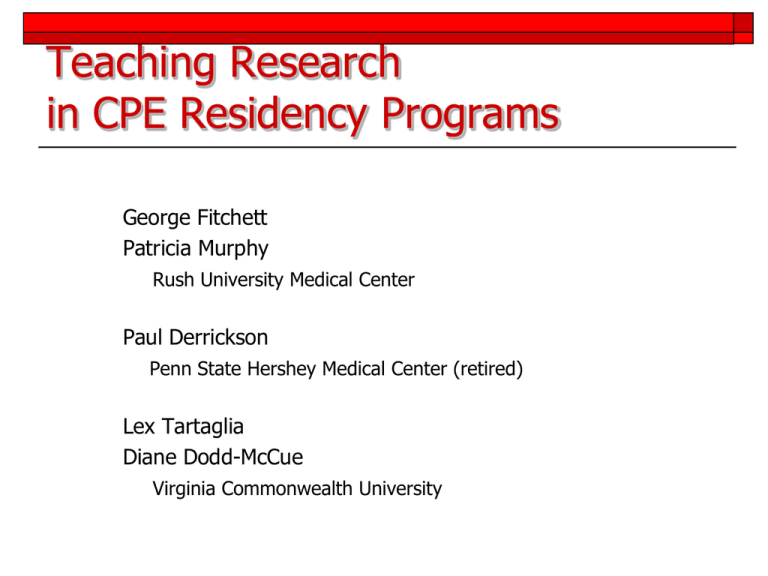
Teaching Research in CPE Residency Programs George Fitchett Patricia Murphy Rush University Medical Center Paul Derrickson Penn State Hershey Medical Center (retired) Lex Tartaglia Diane Dodd-McCue Virginia Commonwealth University Workshop Objectives At the completion of this workshop participants will: be familiar with three levels of engagement with research research literacy, research involvement, and research leadership; be familiar with the case for research literacy for all chaplains as expressed in Standard 12 of the APC Standards of Practice; be aware of the current state of teaching about research in ACPE residency programs; be familiar with examples of curricula that will help CPE residents develop research literacy, research involvement, and/or research leadership. Improving our Care, Making our Case Through Research -.46*** Hopelessness Religious Belief .69*** .17** ***p<.001, **p<.01. N = 271 Depression 3 Making the Case Standard 12: Research The chaplain practices evidencebased care including ongoing evaluation of new practices and when appropriate, contributes to or conducts research. (http://www.professionalchaplains.org4) Making the Case A research-literate chaplain has the ability to read, understand, and summarize a research study and to explain its relevance for his/her spiritual care. Mowat H (2008). The potential for efficacy of healthcare chaplaincy and spiritual care provision in the NHS (UK): A scoping review of recent research. www.nhs-chaplaincy-collaboratives.com/efficacy0801.pdf 5 Making the Case Research Literacy All health care chaplains should be research literate Research Collaboration Some health care chaplains will be qualified to collaborate in research conducted by health care colleagues (coinvestigators) Research Leadership Some health care chaplains will be qualified to lead research projects (principal investigators) 6 Making the Case Basic research literacy includes: Attitudes about role of research in chaplaincy •Recognize importance of research for chaplains •Motivate to engage in research-related CE activities, including journal clubs, workshops, grand rounds Behavior about research •Reduce fear and avoidance of research-related activities such as workshops, grand rounds, research articles Knowledge •Different approaches to the relationship between religion and science •Basic concepts needed to read and understand simple qualitative and quantitative research articles, and appropriately integrate findings into professional practice Teaching Research in CPE Historical Perspective Boisen Cabot Religious Exp. Case (Education) CPE Research on Research on CPE’s Impact Impact of On Students P.C. on PTs (ACPE Research Network) COMISS Res. Comm Secular S/R Research APC Competencies Tensions Here (founding of the Council for Clinical Training of Theological Students) were these three men with three completely different motivations: Boisen wanted it for research Cabot wanted it because he thought these poor people in insane asylums ought to be ministered to Elliot…was interested in having theological education move a little way from books and get into something active. Additions to John Rea Thomas, A ‘Snap Shot” History (1975-2000) of the Association for Clinical Pastoral Education and videotape “Memories of Anton T. Boisen.” Boisen Dr. Boisen was basically a researcher seeking to understand his own and the religious dimensions of non-organic mental illness. (pg 82) When…”CPE became the study of relationships…The study of the human document was no longer exclusively restricted to the patient. Dr. Boisen was unhappy with this development. His research interests in the spiritual meanings of life difficulties, especially in psychoses, were no longer the exclusive interest in CPE. (pg 16) John Rea Thomas, A ‘Snap Shot” History (1975-2000) of the Association for Clinical Pastoral Education. Tony’s Instant Litho Printing, Madison, Wisconsin, ISBN:0-61501144704 Research on CPE’s Impact Paul Derrickson, "Instruments Used to Measure Changes in Students Preparing for Ministry: A Summary of Research on Clinical Pastoral Education Students," Journal of Pastoral Care, Vol. XLIV, 1990 Research in CPE: Past and Present APC Standards of Practice Section 3: Maintaining Competent Chaplaincy Care Standard 12, Research: The chaplain practices evidence-based care including ongoing evaluation of new practices and, when appropriate, contributes to or conducts research. Research Question To what extent are ACPE accredited residency programs educating students for research literacy and competence in support of Standard 12? Overview Project was reviewed by Institutional Review Board of each institution Surveyed a random sample of 21 free standing CPE residency centers and 5 system centers (generated from two lists) Centers were listed sequentially and a random number generator was used to select the random sample Sample represented 12% of programs in free standing centers and 22% of system centers Programs Surveyed by Region Northeast Eastern Mid-Atlantic Southeast East Central North Central South Central Southwest Pacific 1 3 3 6 3 4 1 3 2 Methods One member of research team contacted one supervisor from each center (directory name/referred) Interviews conducted by telephone Began with verification that center offered a residency program that was active and completed at least one annual cycle Asked specific questions about the curriculum as related to research Survey concluded with an open-ended question that invited supervisors to provide additional comments Decision to interview rather than use electronic survey in hope of capturing some qualitative information Survey Instrument Do you have a residency training program in your center? If yes, does your residency program offer training in research related to pastoral care or education? If yes, which method or methods do you employ? Student participation in journal club/discussion groups Didactic presentations and/or on-line training/webinars Student participation in research activities of faculty or staff including activities such as data collection Student assigned research projects Other Additional comments Results Yes= Research education was an intentional part of the curriculum. There were regular times dedicated to teaching research, didactic presentations about research, and/or resident participation in journal clubs or other research activities. Some= Research education was not an intentional part of the curriculum, but some periodic opportunities for reading of research or lectures were included in the curriculum. Results by the numbers Yes Some CPE Centers 3 (14%) 5 (24%) CPE Systems 0 (0%) 2 (40%) All Programs 3 7 (27%) (12%) No 13 (62%) 3 (60%) 16 (62%) All results were independently coded by 3 members of research team (88% initial agreement) Differences were resolved among discussion of entire team Results by themes There was variation among Supervisors regarding meaning of incorporation of research in the CPE curriculum One myth expressed by multiple persons was that it only means students conduct a large project or randomized study One individual thought of it as a multi-case study (but no indication of relationship to single case research) There were multiple descriptions of current research activities in programs including informal opportunities to expose residents to research Observation at IRB meetings; journal clubs; didactics on research compliance; common reading (Pargament) One center continues to use research projects Results by themes Some supervisors wanted to talk about where research education should be taught beyond the residency year. A few supervisors thought that more research needed to be applied to the efficacy of CPE. Factors influencing education about research Factors related to why research not initiated or eliminated Students got busy with other things and never completed projects; demands of clinical responsibilities Loss of Supervisor Interest Student complaints and lack of interest Insufficient expertise among faculty Insufficient time in curriculum Factors contributing toward plans to initiate research Pressure from administration Survival CPE Research Curriculum Approaches: Three Experiences RESEARCH LITERACY Rush University RESEARCH LEADERSHIP Virginia Commonwealth University RESEARCH INVOLVEMENT Penn State CURRICULUM APPROACH: RESEARCH LITERACY CPE Resident Didactic: Introduction to Research for Chaplains Rush University Medical Center Department of Religion, Health and Human Values Who are our Residents? Number Four Rush residents Six Alexian residents Quality We can be selective Normal range of interest in and skills for reading research Willing to try Objectives of the Didactic Develop informed and critical understanding of research in order to apply results thoughtfully to evidence based practice; Be able to read and understand a simple research paper; Be able to describe the implications of a study for their pastoral ministry; Be able to find research through PubMed and ACPE Research Network. What do the sessions look like? The first five sessions We provide information about research and chaplaincy; We spend two one hour sessions in the computer lab practicing searches in PubMed; Residents work in groups presenting articles we have selected. The next three sessions Residents do most of the work in teams presenting articles they have chosen; We provide one didactic on the future of research and chaplaincy. What do we provide? Content Clarity about objectives – they do not have to become researchers: History and directions about chaplaincy research. Direction Three carefully selected articles for the first meetings based on design; Qualitative – easy to read Quantitative – more challenging – gives basic skills Experimental What do we provide? Modeling George and I are chaplains; Two articles are by chaplains to model research in chaplaincy; Models of chaplains who collaborate with other healthcare professionals. What do we provide? Support The Research Summary Outline 1. Background Importance of topic Review of literature Study aims, research questions, or hypotheses 2. Research methods Sample Study Design 3. Results 4. Discussion (by the study authors) Integration with other research Limitations Implications for further research Measures Analysis 5. Critical Evaluation (your thoughts) 6. Clinical Implications (your thoughts) For your work? For the work of other clinicians? Does this take away from residents’ other training? We meet during the winter between time of their quarters; We meet two times a week for 8 weeks for a total of 20 contact hours. They read outside of the sessions to participate actively. They spend time preparing their article. Does it work? Evaluations Helpful because I used to think research was for someone else. Really helpful for professional chaplains. I see a great deal of benefit of reading research in a group. I would like to continue to do so as part of professional development. The faculty are outstanding. Both have been approachable and available and willing to answer all questions. Behavior Present articles at and attend departmental bimonthly journal club; Share articles they have found. CURRICULUM APPROACH: RESEARCH INVOLVEMENT Teaching Research in CPE Residency: The Spiritual Pathways Project Penn State Hershey Medical Center Curriculum for a Spiritual Pathway Project: Integrating Research Methodology into Pastoral Care Training, with Angelina VanHise, Journal of HealthCare Chaplaincy, 16(1), 2010. Penn State Hershey Medical Center CPE Residency Training Announced in advertising and website Introduction and lectures on research –Nov Integration period-Dec-research natural history and treatment of a disease and pastoral care Develop spiritual plan & begin Jan- March Integration period-April – begin collating data Write up presentation for summer students, peers, supervisors and staff chaplains May-July Strengths Models what chaplains of future need to do Give students overview of research Familiarity with some S/R and health literature Skills in literature search, critique and incorporation into pastoral work. Time management Staff interactions increased (credibility) Improvement in patient care “Products” improved over time Weaknesses Dependent on supervisor & their interest and skills Time – shortcuts (previous projects, loose leaf notebooks, etc) – second year residency? Pushing toward IRB involvement Resistance because counter-CPE model Need a lot of support – library, staff with research skills, etc CURRICULUM APPROACH: RESEARCH LEADERSHIP CPE Resident and MS Student Research Courses Virginia Commonwealth University School of Allied Health Professions Department of Patient Counseling Research and VCU’s CPE Program: An Evolving Story Seeds planted in leadership courses Research ethics a core topic in ethics course Growing involvement of faculty in research projects Masters programs and research expectations Patient Counseling Track in Health Services Research PhD Program VCU CPE Perspective on Research “Chaplains are involved in research every day. It’s a part of what they do.” Emphasis on “best practices” or “quality improvement” Areas of focus: Pedagogical, Service Line, Administrative Role of collaboration- at many levels Research integrated, not stand alone Cultivating resources across the health system and university Compliment board accreditation standards VCU CPE Course Coverage RESEARCH LEADERSHIP Course: Developing and Presenting Hospital Chaplaincy Research RESEARCH INVOLVEMENT Course: Evidence Based Inquiry for Hospital Chaplains RESEARCH LITERACY Course: Research Basics for Hospital Chaplains Research Involvement: Evidence Based Inquiry “Best practice” or ”Quality improvement” perspective Emphasis on topic with value to practice Emphasis on merits of collaboration Application of measurement understanding Application of research design understanding Application of sampling understanding Status of 2012 Evidence Based Inquiry Course Chaplain residents developing profile of unique organizational culture of hospital units Results of value to chaplains as introduction to new service lines and for tailoring pastoral care to unique service lines Developing, piloting organizational culture survey based on literature Developing research protocol to promote consistency and replication Research Leadership: Developing and Presenting Chaplaincy Research Interpreting results to add value to collaborations and performance Identifying audiences and avenues for dissemination Selecting the most effective ways to delivery results Considering implications for practice and future activities VCU CPE Residents’ Past Research Projects: Curriculum Evaluation Through Final Efforts CPE alumni survey Survey of spirituality of hospital employees to identify services desired The arctic protocol and patient family perceptions of pastoral care Spirituality and coping of African-American male heart surgery patients Staff assessments of spiritual support using chaplains and multidisciplinary teams Lessons learned…. and still learning “Keeping it real” Faculty engagement and involvement Nurturing collaborative relationships Locating and using available resources Gaining and maintaining commitment from students Addressing time constraints “Eye on the prize” deliverable Instrumentality and board certification Discussion Time Your questions and input are welcomed! Contact Information George Fitchett George_Fitchett@rush.edu Patricia Murphy Patricia_Murphy@rush.edu Paul Derrickson pderrickson@comcast.net Lex Tartaglia aftartag@vcu.edu Diane Dodd-McCue ddoddmccue@vcu.edu This presentation and related information about this project is available at the ACPE Research Network website, http://www.acperesearch.net/ A complete account of the survey of ACPE programs and research training will appear in an upcoming 2012 issue of The Journal Of Pastoral Care and Counseling.
